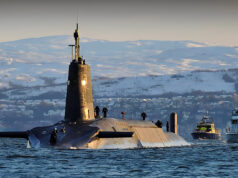The United States Navy has awarded TexTech Engineered Composites a USD 76.8 million contract to deliver carbon phenolic heatshield materials and other reentry components for American and British strategic missile programmes, according to the contracting notice.
The award, made on 2 October, is described as a “cost-plus-fixed-fee indefinite-delivery/indefinite-quantity contract for the delivery of carbon phenolic heatshield materials and other reentry materials.”
The notice specifies that it “combines purchases for the U.S. Navy (98 percent) and the government of the United Kingdom (2 percent) under the Foreign Military Sales program.”
Work will take place in Winston Salem, North Carolina, and is scheduled to run “to be completed by October 2030.” At award, the Navy obligated USD 4.3 million in research, development, test and evaluation funds alongside USD 3 million in UK FMS funds. The contracting office confirmed that “$4,309,864 will expire at the end of the current Fiscal year.”
The Navy stated that the contract was not competed, citing 10 USC 3204(a)(1), with the notice saying the award was issued because “only one responsible source and no other type of supplies or services will satisfy agency requirements.” TexTech is one of the few US suppliers capable of producing the specialised carbon phenolic ablative materials used to protect reentry bodies during extreme atmospheric heating.
Carbon phenolic remains integral to thermal protection systems for submarine launched ballistic missile reentry vehicles. The UK’s two percent share reflects its participation in the Trident missile enterprise through long standing cooperative arrangements with the US Navy.
The Navy said the contract supports both ongoing reentry material production and development work, with the RDT&E funding indicating continuing improvement and qualification of thermal protection materials.
The Naval Surface Warfare Center Dahlgren Division is listed as the contracting activity.














That blasted BBC News edit of Trump’s speech could have far-reaching consequences for future defence deals with the USA. Whatever nonsense some observers may say about the ‘Special Relationship’, it amounts to huge advantages for UK defence and commerce.
I cannot stand Trump as I think the man is
1) divisive for US political cohesion and I personally want a strong cohesive US as the lead liberal democracy and I think he and his cohorts have walked the US into a classic Chinese political warfare trap.
2) Divisive for western unity.. the west can only be the dominant paridgm if European powers, the U.S. and pacific democracies walk hand in hand.. as soon as they split.. china and Russia together have the ability ( or will have within a decade ) to challenge any one group on its own.. but I still believe if the entire west was unified and its populations held faith with their polical leadership through serious suffering the west would win.
Essentially I consider him a geopolitical and geostrategic idiot who’s profoundly damaging the future of the west.
But and this is really important as a Broadcaster the BBC represents the UK as a whole as such it is charged with being completely unbiased in its reporting.. its whole purpose is to find and publish the truth.. so supporting the core strength of a liberal democracy.. a well educated electorate that has sources of information it can trust.. this a a massive breach of that.. essentially the bbc has been found to twice twist the truth around what happened on that profoundly impactful day in US democratic and constitutional history.. it fucked up very very badly and I don’t think we have seen the last of the repercussions of that .. both geopolitically ( an institution of UK fairness and honesty has been found to lie) and from an internal political point of view around our own populations further reduction in trust in our media and information… china and Russia are laughing their arses off about this… they could not have scripted it from a political warfare activity point of view.
Hi Jonathan I do think this may actually be your finest post so far and I am being completely serious ! Your last paragraph is an absolute belter and anyone who understands the nuances of the 2023 National Security Act will understand why !
The fact is this act may be an “honest mistake” or one of omission but the detrimental effects on our relationship with our Largest NATO ally may directly impact the Defence of the Realm. So surely some bright spark in HMG would send in the Security Services to find out if there is any possibility of this being the covert actions of a foreign agency.
If nothing else it will mean a lot of squeaky bottoms in the BBC and we would find out who did it, who authorised it and why ?
The bit that really gets me angry about this is in most companies anyone caught and proven to be “acting against the best interests of the business” is held to account and likely dismissal ! I think trashing the BBCs reputation and being sued pretty well counts as not being “a good day at the office”.
But not one single peep out of the BBC or HMG about investigations, suspensions or any HR actions what so ever.
So yes I’d send SB in, investigate, pull emails and whatever else is necessary to find out how this happened ! We may get some very unpleasant surprises because the BBC (mainly the TV side of it) is being caught out repeatedly being biased on way too many occasion’s.
If it transpires it’s some idiotic production decision made as “it doesn’t matter as he lost and will not be back” then boy did they muck up and let Trump sue them instead.
I was 14 when I started to detect systemic biases in the BBC which left me scratching my head. I didn’t understand my observations at that time but they started to form data points.
It took another decade of watching and listening but as I slowly became critical of the European project and began to arrive at different conclusions about the world I realised the BBC not only had a very particular worldview but actively worked against alternative descriptions of “reality”.
Not only did they not present facts equally, they allowed mockery of different opinions and rarely subjected their own position to similar scrutiny.
Not long after I stopped watching the BBC. I never used the online portal and eventually gave up watching broadcast TV so I did not gave to subsidise what I came to believe was a malignant influence on British society. That was over 20 years ago now.
This is not a new phenomenon and I have come to the conclusion that most people’s opinions are not formed by reasoned criticism but by the drip feeding of a highly conformist British media with very little real diversity of thought.
Because I read widely, I have twice observed on matters trump, specific phrases promulgated by the Democratic party press office, directly retransmitted by friends in the NYT that were picked up by different poles of the British media and re-presented as unique analysis. And I watched colleagues and friends regurgitate ideas from that Democratic parties press office as though they were their own.
I personally am very sceptical of all British media and think the people are largely uninformed and what they do know has been curated for them.
Some of us have been suggesting that bias and agenda has run through the BBC for years, all the way back to before Brexit.
We’ve had rows about it here before.
Low and behold….
I’m sick to death of their bias, just report news. Leave it to others to reach conclusions.
Channel 4, ITV news, they all do it.
They can keel their “special relationship”
I see great benefit to them, little for the UK.
I would much rather pay the small amount of money for a fully autonomous deterrent than share anything with the current US administration or likely future ones.
Americas day has passed, time to move on.
Jim and Jonathan, we have to look beyond the current administration and recognise the long-term benefits of the ‘Special Relationship’, as it’s a concept that most of the time appears to be mostly vacuous. However, the relationship may well run far deeper than we acknowledge and no doubt we would be amazed by just how much cross-trade in intelligence data and other subterranean activities exists beyond the public’s gaze. On balance, I guess the secret world of intel exchange will continue regardless of who is sitting in the White House. That said, the public’s perception is influenced by what the media says and headline comments made by Trump’s cabinet members that incite the press to forecast a degradation of the ‘Special Relationship.’ Such cheap populism won’t damage the long-term union, as one US gentleman once told me, ‘Whatever differences we have, we are still kin.’ I’m sure some allies would like to see US/UK relationship under strain for whatever reason, but have no fear, it will outlive Trump.
Jim, America is not to be written off, and she will always be a critical component of the West’s security for many years to come.
In her long history, America has spent the vast majority of her time in isolation and detached from the collective west. I suggest the 1945 to 2016 period was a blip and the country is reverting back to its historical norm focusing solely on the western hemisphere. Democrats are just as inclined as republicans to view the world this way now.
Jim, an interesting observation, however, since 1945, America created the business model known as multinationalism, though some US companies began investing around the globe before then, such as Ford Motor Company. The economic tentacles stretched far and wide, making the US the richest country in the World. In concert with this revolution was the expansion of its military, especially in Europe. Too many Americans died attempting to defeat Germany and Japan to turn inwards as in the old Rudrow Wilson days. Basically, where there is important US monetary investment, you will generally find its military ensconced there. The old mantra, ‘Dollar Is King’, is still alive and very much kicking and as long as that mindset exists, so will US military commitment. The US will not expose its interests to the Russian threat in Europe (no matter how much Trump complains), and that is principally why the Europeans let it carry the military burden for all these years.
Time will tell however the US economy is one of the least trade dependent in the world and US industry is increasingly disconnected from the US economy or people.
Apple ain’t no Ford in terms of jobs
True, but one of the outcomes of multinationalism is the disconnection from the possible homeland, political and economic chaos. However, at the end of the day and in most cases, it’s the survival of the home currency, in this case the Dollar.
regards
Maurice
Small amount of money are you being serious ? To be truly independent it would require our own Sovereign Satellite systems to support worldwide communication’s and targeting data, our own design and the ability to produce a MIRV, a completely new Command & Control system and the design, construction and testing of an actual SLBM.
Simplest way to do it would be to speak to France as I suspect they would just love to reduce their expenditure by half.
Fact is we pay very little for US R&D costs and what we buy we get at the same cost as the USN as it’s bundled in with their orders, it’s actually a very good deal. Don’t be under the illusion the US do this as a good will gesture, they do it for access to our territories, industry abilities (you would be surprised what we make that ends up in US boats) and it’s the uncertainty factor in deterrence.
The latter is key to it all as it’s all down to the uncertainty principle, a country may attack NATO but decide to avoid hitting US forces with Nucs and make an educated guess that a US President does nothing, but what about us we and France are the Jokers in the calculation.
The classic argument in the Cold War was that Russia could do precisely that and possibly get away with it, but if the U.K, France or both retaliate we would do so much damage to them that essentially they would lose, leaving the US still standing.
I suggest given the annual budget of HMG is north of £1 trillion that the cost of a fully independent deterrent is relatively small. I have no issues sharing R&D with France or even the US to save money.
However having design, manufacture and maintenance of the system domestically based should be our longer term goal.
France spends @ €6 billion pa on maintaining its Nuclear forces, now bear in mind they have a fully developed Sovereign industrial base with decades of developmental knowledge that’s a low figure. So France would either want a Kings ransom to share their tech and demand 100% work share or we have to start from scratch ! If you think the bill of developing Tempest is big you ain’t seen nothing yet.
Cheapest way to do it would be land based ICBM on a deployable dispersed TEL system (just like Russia).
Me I’d stick with the US till Trump has gone.
€6 billion is around 0.5% of government expenditure. Granted much of the tech would take time especially around ballistic missiles but we are hardly starting from scratch in most regards atleast outside the boosters. Would France sell us the technology, probably but even if they don’t solid fueled rocket boosters is a very old technology now and easy to replicate.
If we want it easy and cheap you could always stick a nuclear warhead on the new long range cruise missile we are developing with Germany. It’s say this woukd be a superior solution to land based IRBM.
However I don’t see a modified skinnier version of the M51 developed for British use to be unachievable in a decade or so.
Personally I would be willing to pay rather than see what happens in 2028.
Memo from America. Don’t let the screen door hit you in the arse on the way out. Good riddance!
Memo from the UK. We do not want anything to do with your declining fascist shithole of a country.
Trump did incite a riot as part of an attempted coup. The fact that he never stood trial makes the USA an embarrassment to the West.
Champagne style nuclear system on a brown ale budget, you have to hand it to HMG, pretty sweet only picking up 2% of the cost.
Thanks 🙏 to MAGA
😀
Yes Maurice 10, aligned to Vance’s statement about the UK becoming the first Islamic Nuclear armed state Starmer has some real serious grovelling to do. I hope he realises that, but I am not over confident he will.
“First Islamic nuclear armed state” tell me you’re joking…
he obviously has never heard of Pakistan, also never been to the UK and watches way too much Fox News & Co.
What Vance was saying included the ability to attack the US Pakistan may have a bomb but to the best of my knowledge it has no further reach than say India.
This is one area that the UK will need to get a sovereign capability on if it is planning to use project nightfall as a steppingstone. You dont need this capability if your just building a short range ballistic missile like project nightfall, but if you want to move to medium and then intermediate range ballistic missiles then sovereign ability to design and build heat shields for re-entry vehicles is fundamentally important.. it’s why lots of people can build a short range ballistic missiles and the are common as you like but very few can build medium range and beyond… personally I think if we want to convince Russia the UK is a nation that’s two hard to chew on we need a sovereign capability to build medium to intermediate range ballistic missiles and pop both conventional and nuclear warheads on them.
We did have one. UK invented a quartz phenolic for aeroshells (3DQP). It was used on Chevaline. As to what happened to it? No idea.
There are still companies in U.K that can do the production as very similar materials are used in certain electrical products.
It is slightly strange that we don’t have our own equivalent of what I like to think of as S Korea and China’s ‘Strategic Artillery’. We are an island with lots of island bases, why don’t we have the ability to strike over long distances, and the targeting satellites etc to go along with it? GCAP carrying STRATUS might be a substitute by the mid-2030s, but it is very strange that we have abandoned that sort of reactive capability since, essentially, the retirement of the V-bombers.
As a thought experiment, imagine if instead of the carrier project we had built up a satellite constellation and the ability to produce conventional missiles of 3000-4000km range and then stationed them on Cyprus, the Falklands, the Shetlands etc. as well as in K-VLS-II style large silos on our warships and maybe even the Astutes (if we had started early enough). Would that represent more or less capability and value for money?
Of Feck me, How can a post about Heat shields get so rediculously stupid ?
Deary me, You lot need to get out more !
I need to get out more !
Anyone up for a pint and a curry ?
Me. This place turns into the UK Politcs Journal too often.
I resent that the UK is in any way reliant on the USA for our nuclear deterrence. I’d be willing to endure financial pain to see the UK stand it’s own weapons up – such that they too are obliged to respect the power they hold. That is, after all – the whole point of nuclear deterrence.
It’s become clear in recent times that our nuclear deterrence need apply to all countries – including our once closest allies.
I agree, I would happily pay more income tax if it meant we had a nuclear deterrent that was completely independent in every way, shape, and form